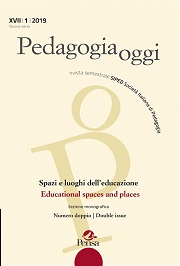Public spaces as educational places: children’s autonomy, independent mobility and active lifestyles
Abstract
According to recent studies, the progressive privatization of urban public spaces has been to the detriment of children’s independent mobility and autonomy, especially in our country.
From an integral pedagogical point of view, school and extracurricular educational policies should take on the responsibility of community planning, extending beyond the school to inhabit public spaces as democratic places, with truthful educational intentionality. The frequent use of, or better still, participation in the planning of spaces, which enable their transformation into places, indicate their polysemy, expanding their classification and offering further opportunities for vicariance, in so doing revealing their functions in terms of outdoor education, and urban and environmental pedagogy. Thus, the body, play, and physical movement take on the privileged role of indicators, including with reference to the proposal for conceptual models, based on independent mobility, which encompass the full range of the child’s experiences of movement.




